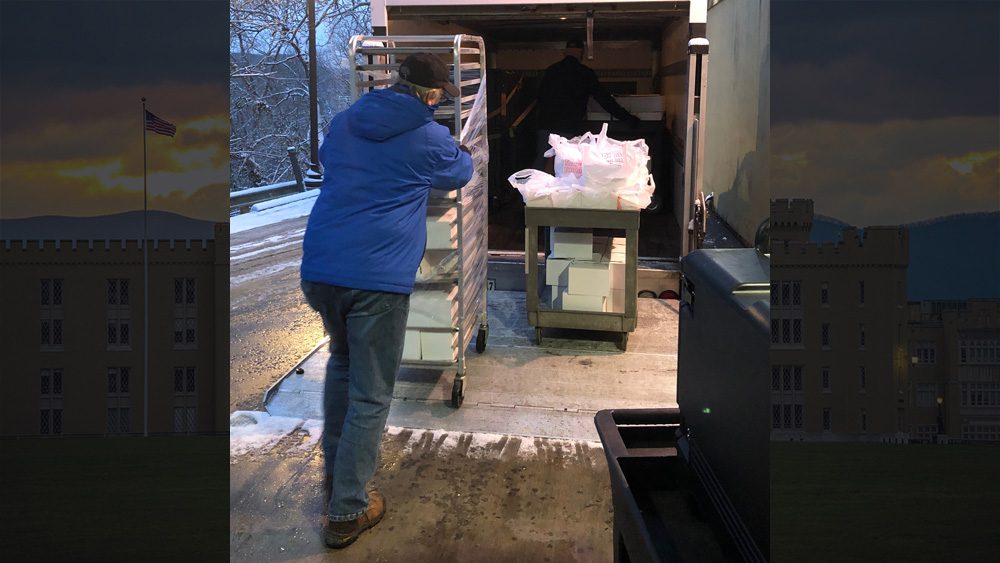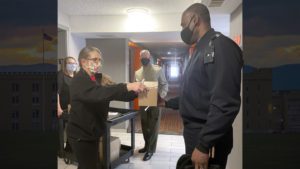Auxiliary Services Rises to New Challenges

Parkhurst Dining employees Dan DeCarlo and Jon Davis load meals for cadets in isolation and quarantine onto a truck outside Crozet Hall in mid-February.—Photo courtesy of Lt. Col. Lee Clark ’93.

Parkhurst Dining employees Dan DeCarlo and Jon Davis load meals for cadets in isolation and quarantine onto a truck outside Crozet Hall in mid-February.—Photo courtesy of Lt. Col. Lee Clark ’93.
College meal service is a challenging line of work as is—but factor in the COVID-19 pandemic, and cadets being kept in isolation or quarantine, many off post, and the challenge factor goes up exponentially.
As of mid-February, Lt. Col. Lee Clark ’93, Auxiliary Services director, was responsible for coordinating meal delivery to approximately 400 cadets in isolation or quarantine. Some were in barracks, some at the Turman House, and others were being housed at four hotels north of Lexington.

Maj. Gen. Cedric T. Wins ’85 and Sgt. Maj. William T. Sowers get their boxed lunches from Parkhurst employee Zandra Boone at the Econo Lodge in Lexington, as she and fellow employee Felice Bartle deliver meals to cadet rooms.—VMI Photo by Maj. Beth Holcomb, VMI Communications & Marketing.
Mondays through Fridays, cadets are provided with three meals a day. A hot breakfast and a box lunch are delivered together in the morning, and supper is provided later. The lunch consists of a sub sandwich, snack foods, fruit, and a beverage. On Friday evenings, cadets are given a large snack box with extra food to help them through the weekends. On Saturdays and Sundays, cadets receive a midday brunch and supper.
“We give them a lot of food just to get them through the day,” said Clark. He added that cadets with dietary restrictions are provided with the appropriate foods at their door step, and some cadet-athletes are receiving extra rations at their coach’s request.
And it’s not just cadets who’ve been eating what’s provided: Maj. Gen. Cedric T. Wins ’85, interim superintendent, and Sgt. Maj. William T. Sowers, sergeant major to the Corps of Cadets, have been eating the box lunches as well. They do so on the same days they visit cadets quarantined in hotels.
Crucial to making this all flow smoothly has been the support of Parkhurst Dining, VMI’s food service partner.
“The Parkhurst team has been fantastic with this,” said Clark. “They are in constant communication with Sgt. Maj. [Suzanne] Rubenstein in the commandant’s office. She runs the whole process of finding rooms for the cadets to quarantine and isolate, and tracks [the cadets] by name.”
Those working to provide meals communicate by group text so information is passed along quickly, said Clark, and there’s been a big effort to solve problems as they arise. Clark noted that the Styrofoam containers typically used for takeout food weren’t working well because Styrofoam can make food soggy.
“We found a different plastic packaging container that doesn’t make the food as soggy,” he commented. “I’ve got a smart team of food service experts, and they’re continually trying to improve this.”
Clark and Lt. Col. Alyssa Astphan, Auxiliary Services assistant director, have also been working hard to let parents know that their cadets are being fed well. The two have been making short videos showing the meal preparation and delivery process.
“They’ve been very well received,” said Clark of the videos.
The Auxiliary Services website was also recently revamped to highlight the multiple areas of cadet life the department is involved in, with an ultimate goal of making it easy for parents and others to know when operational changes that affect cadets occur, along with who to contact with questions or comments. Right now, the focus is on meal delivery for cadets on post and in quarantine and isolation. When comments come in, Clark makes sure to call parents himself. “I’ve had some very good conversations,” he stated.
He’s making it a point, though, to make sure the credit goes to those preparing the food.
“It makes for some long days for the Parkhurst team,” he commented. “They’re pushing hard.”

The development writer plays a key role in producing advancement communications. This role imagines, creates, and produces a variety of written communication to inspire donors to make gifts benefiting VMI. Utilizing journalistic features and storytelling, the development writer will produce content for areas such as Annual Giving, stewardship, and gift planning.